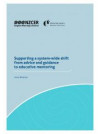This paper draws on a 3-year evaluation of induction and mentoring in New Zealand early childhood education settings and schools conducted by the New Zealand Council for Educational Research (NZCER) for the New Zealand Teachers Council (the Council), now called the Education Council Aotearoa New Zealand. The study sought to establish the impact of Council resources on shifting mentoring from advice and guidance to educative mentoring. The paper describes the particular challenges for the Council in implementing new arrangements for induction and mentoring in a highly devolved education system.
Methodology
Programme Logic and Activity Theory shaped our mixed methods approach. Surveys of provisionally certificated teachers and mentors provided a broad snapshot of the characteristics of induction and mentoring programmes and identified effective practice. Case studies provided deeper insight into how induction and mentoring was operating in specific sites.
Key Results
Our survey showed that most provisionally certificated teachers were involved in well structured induction and mentoring programmes. Mentoring was most effective where it was embedded in early childhood education settings and schools and where all staff shared responsibility for the provisionally certificated teacher’s learning. While many mentors surveyed considered they were effective ‘educative’ mentors, this was not borne out by many of the case studies. Our findings led us to conclude that system-wide effective induction and mentoring might most profitably be part of wider initiatives designed to enhance teaching and learning. Any sustained change will require adequate and equitable resourcing for sustained professional learning for provisionally certificated teachers and mentors.

